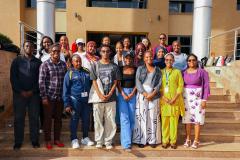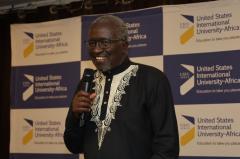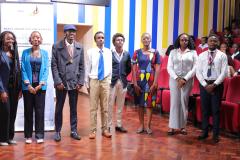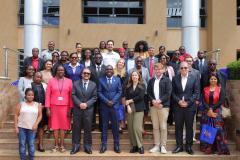VCs Weekly Higher Education Digest: April 15, 2019
KENYA: Universities struggle to meet PhD and other targets By Gilbert Nganga UNIVERSITY WORLD NEWS
Kenya’s bid to build a critical mass of professors and produce at least 1,000 PhDs every year to drive the country’s economic ambitions risks failure following persistent deficiencies in postgraduate training and research. It is estimated the country graduated only 700 PhDs in 2018. According to government statistics, the number of professors in public universities has risen by a measly 11% over the past five years while student numbers soared by over 70 per cent during the same period.
https://www.universityworldnews.com/post.php?story=2019040813442377
Embrace lifelong learning or risk obsolescence, universities told By Ellie Bothwell TIMES HIGHER EDUCATION
Higher education risks becoming obsolete if it does not fully embrace lifelong learning, the head of a leading US university has claimed. Joseph Aoun, president of Northeastern University, told the Times Higher Education Innovation and Impact Summit that lifelong learners made up 74 per cent of learners in the US, and only 34 per cent of universities in the country “fill their seats”, but higher education has not yet incorporated lifelong learning as part of its core mission.
https://www.timeshighereducation.com/news/embrace-lifelong-learning-or-risk-obsolescence-universities-told
Campus finance leaders have concerns over financial status quo By Mezarik UNIVERSITY BUSINESS
“Higher education is the Blockbuster Video store in a Netflix world.” That’s the way one campus finance administrator describes the need to alter the business model of higher education. Of the 113 finance leaders who responded to UB’s survey, one-third were from institutions with 1,000 to 5,000 students and one-quarter were from those with more than 15,000 students. Colleges and universities continue to rely on tuition revenue for increases in revenue, with 53 percent expecting at least modest increases in this area (only 4 percent, however, anticipate significant increases).
https://universitybusiness.com/campus-finance-leaders-have-concerns-over-financial-status-quo/
Campus security: Helping the college community using GIS and IPS By Mark Rowh UNIVERSITY BUSINESS
A fire is reported in a biology lab. Campus security officers greet firefighters with digital maps showing entry points and information on flammable materials and nearest fire hydrants. Hiding in a classroom building where she thinks she has heard gunshots, a student alerts security to the situation via an app. Aware of her exact location, officers secure the scene and instruct her when it’s safe. Geographic information systems (GIS) and indoor positioning systems (IPS)—which provide an accurate way to locate students, safety officers, employees and others during an emergency—offer many security applications for campuses.
https://universitybusiness.com/campus-security-helping-the-college-community-using-gis-and-ips/
Managing your university’s image in the age of #MeToo By Eden Gillott UNIVERSITY BUSINESS
Do you know what you’d do if your university landed in the spotlight amid #MeToo allegations? In March 2018, Michigan State University’s dean of osteopathic medicine was arrested and charged with mishandling abuse complaints against since-convicted serial child molester Larry Nassar, who was the USA Gymnastics national team doctor and an osteopathic physician at the school. Two months later, the university agreed to pay $500 million to Nassar’s victims…. The best time to act is at the first whiff of trouble when you have more options— not after your university is in the headlines and its reputation is already damaged.
https://universitybusiness.com/managing-your-universitys-image-in-the-age-of-metoo/
When (and why) students bully academics By Dirk Lindebaum TIMES HIGHER EDUCATION
The argument that students have become consumers of higher education will no longer raise eyebrows among readers of Times Higher Education. Equally uncontested is probably the point that students develop a greater sense of entitlement – that is, an expectation of academic success with less or no personal responsibility for achieving that success – as a result of embracing consumer attitudes. [Students] sense of entitlement (to graduate, for instance) may be growing as a result of the substantial (particularly, but not exclusively, international) fees that they pay. If that is coupled with strong cultural and parental pressure to obtain a degree, this can lower students’ behavioral thresholds to such an extent that harassment and bullying are deemed legitimate tools to undo the violation of their entitlement expectation.
https://www.timeshighereducation.com/blog/when-and-why-students-bully-academics
Purpose as Well as Paycheck By Jeremy Bauer-Wolf INSIDE HIGHER EDUCATION
Recent college graduates want “purpose” in their jobs, but they aren’t always finding it, according to a new survey. The report, "Forging Pathways to Purposeful Work," from Gallup and Bates College, found that 95 percent of four-year college graduates nationally considered a sense of purpose at least moderately important in their work. (Note: Gallup conducts some surveys for Inside Higher Ed, but this publication was uninvolved in this study.)
https://www.insidehighered.com/news/2019/04/11/gallup-bates-report-shows-graduates-want-sense-purpose-careers
‘Look beyond classical university model’ to tackle unemployment By John Gill TIMES HIGHER EDUCATION
Nations should consider rebalancing their education systems, and potentially reducing university enrolment levels, to tackle youth unemployment rates that are a “tragedy” in many countries, a conference heard. Lino Guzzella, former president of ETH Zurich, told the Times Higher Education Innovation and Impact Summit that the diverging opportunities for those with and without the highest-level skills meant that “you are now either a genius or you are flipping burgers”.
https://www.timeshighereducation.com/news/look-beyond-classical-university-model-tackle-unemployment-countries-told
Call to fight the spread of corruption in HE globally By Brendan O’Malley UNIVERSITY WORLD NEWS
Corruption is ubiquitous and diverse in higher education, affecting every part of the world to some extent. It includes unethical, inappropriate, sometimes illegal practices, but the types and prevalences vary between countries, according to a new report published by the Council for Higher Education Accreditation (CHEA) and the CHEA International Quality Group (CIQG).
https://www.universityworldnews.com/post.php?story=20190412095537415
Why we must collaborate to innovate across the world By Frédérique Vidal UNIVERSITY WORLD NEWS
We are facing important collective challenges…. Science has made these challenges known to the wider public. My profound belief is that science also has one of the greatest roles to play in finding solutions. In fact, the greatest revolutions the world has known were born in labs. This must be said and repeated to all those who question the role and place of science. At a time when our values are under threat, research allows our societal models to adapt and keep moving forward in the face of difficulties, should they be environmental, societal, technological or medical.
https://www.universityworldnews.com/post.php?story=20190409082715988
Towards a more collaborative university By José Loureiro UNIVERSITY WORLD NEWS
Globalization and neoliberalism have dramatically changed the ways we view health and education services. In these two arenas, we see the most striking social inequalities and these extend throughout the Global North and South. For example, universities have progressively multiplied in number, with many bogus and unaccredited universities operating in the market, trading online and in-person courses. However, despite the increase in numbers, not everyone has access to higher education.
https://www.universityworldnews.com/post.php?story=20190314083139498
Changing attitudes to university teaching and research By Futao Huang UNIVERSITY WORLD NEWS
Since the early 1990s, the traditional role of the academic has been greatly expanded and significantly challenged in large part due to massification, marketization, internationalization of higher education and the advancement of the knowledge society. Three international projects over the past three decades have explored both the reasons for and the consequences of these changes.
https://www.universityworldnews.com/post.php?story=20190408143502971
Academic taxi drivers in a global marketplace By Lars Engwall UNIVERSITY WORLD NEWS
In many countries there appears to be a considerable number of well-educated taxi drivers of foreign origin. Their number seems to have increased over the past 25 years. This observation, of course, leads to the question, why are they driving taxis and why don’t they have jobs corresponding to their level of education?
https://www.universityworldnews.com/post.php?story=20190408093615670
The silencing of academic voices in turbulent times By James Seacart UNIVERSITY BUSINESS
Academic freedom, which has existed since the early 1900s, is important to our democracy. Scholars can influence policy with arguments rooted in fact and empirical evidence, rather than in partisanship. Unfortunately, the voices of academics are increasingly absent from our national discourse. The continued erosion of academic freedom will further undermine the confidence, willingness and ability of scholars to weigh in on matters of importance to our democracy.
https://universitybusiness.com/the-silencing-of-academic-voices-in-turbulent-times/
‘The Time for Engagement’ By Colleen Flaherty INSIDE HIGHER EDUCATION
Does academic freedom have a future? Nobody has a crystal ball. But as former vice president of the American Association of University Professors and longtime chair of its committee on academic freedom and tenure, Henry Reichman is particularly well suited to ponder the question. Reichman, professor emeritus of history at California State University at East Bay, spends 275 pages doing so in his new book, The Future of Academic Freedom (Johns Hopkins University Press).
https://www.insidehighered.com/news/2019/04/09/henry-reichman-discusses-his-new-book-future-academic-freedom
Swap secondments with business and government, universities told By John Ross TIMES HIGHER EDUCATION
University, business and government administrators should trade places in scheduled secondments to improve cooperation on policymaking, according to a governance expert. John Simpson, a member of Monash University’s council, said that industrialized economies – and Australia’s in particular – could never achieve their full potential unless the private, public and academic sectors worked together “in a more integrated and intelligent way”. The former oil and gas executive said that, alongside secondments, the higher education sector should stage roadshows to explain itself to government and corporate decision-makers.
https://www.timeshighereducation.com/news/swap-secondments-business-and-government-universities-told
Legal Battle Over Captioning Continues By Lindsay McKenzie INSIDE HIGHER EDUCATION
Two high-profile civil rights lawsuits filed by the National Association of the Deaf against Harvard University and the Massachusetts Institute of Technology are set to continue after requests to dismiss the cases were recently denied for the second time. The two universities were accused by the NAD in 2015 of failing to make their massive open online courses, guest lectures and other video content accessible to people who are deaf or hard of hearing.
https://www.insidehighered.com/news/2019/04/08/mit-and-harvard-fail-get-out-video-captioning-court-case






